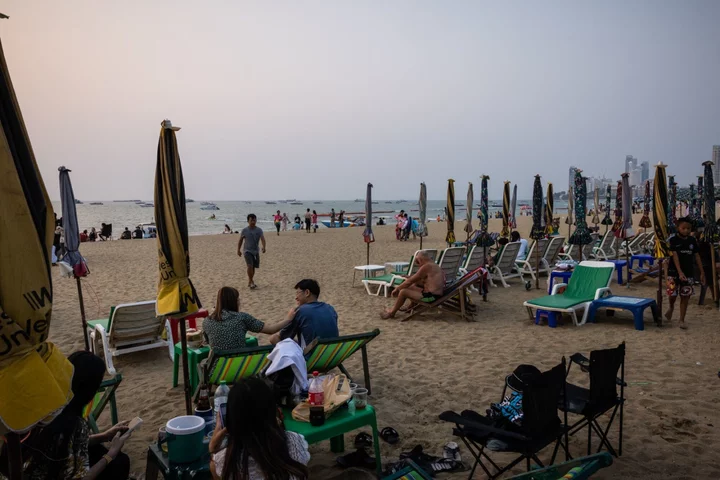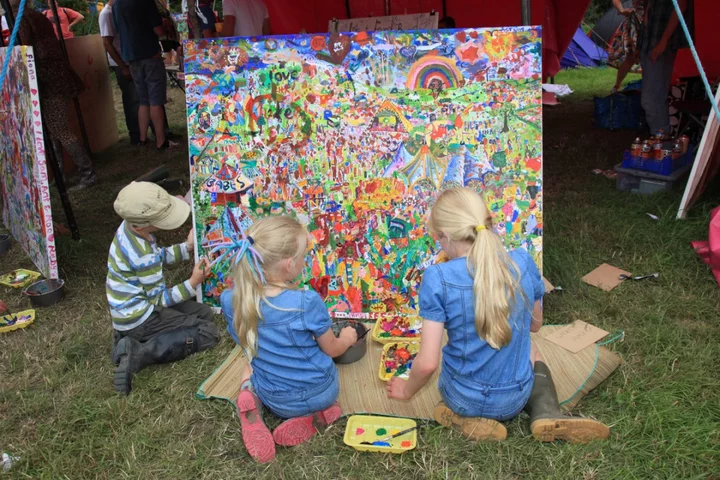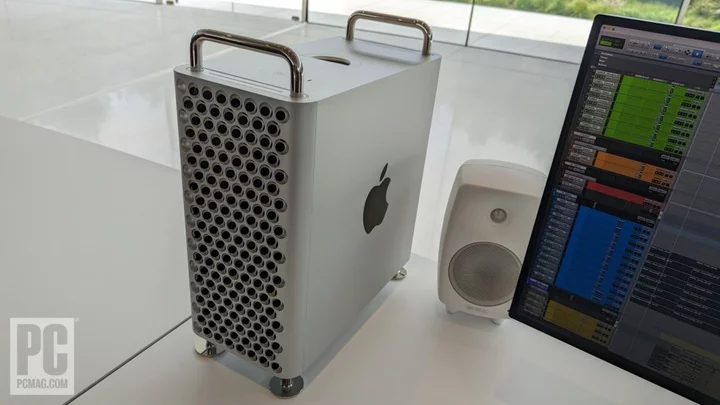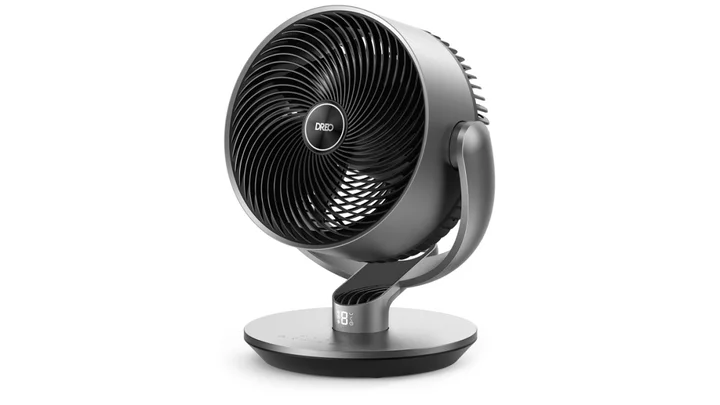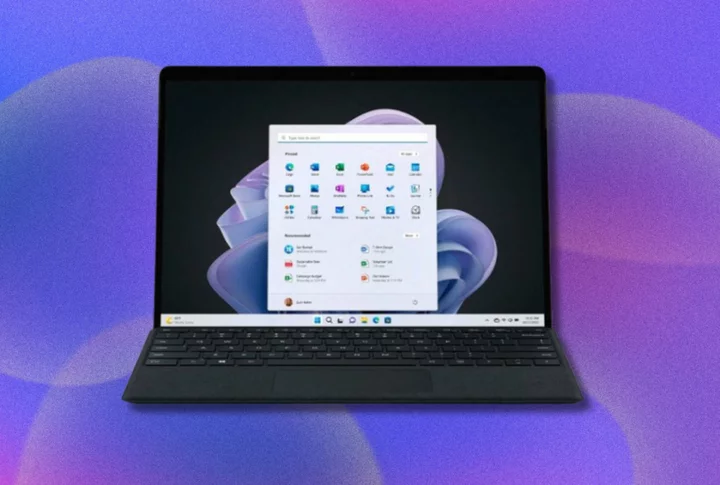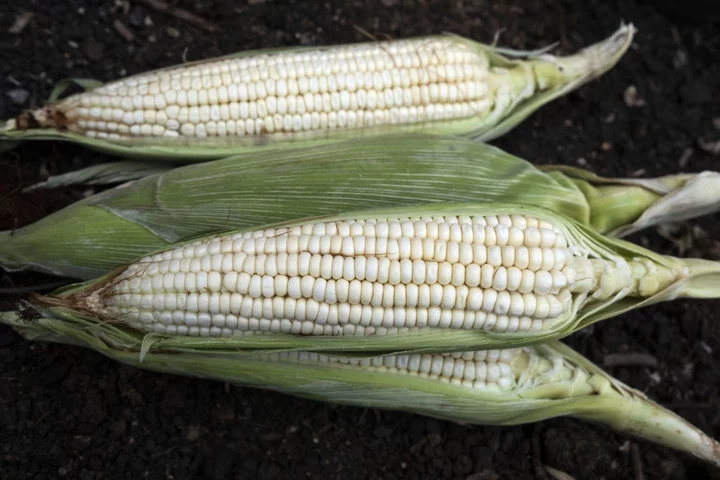Queer parents need everyone’s support, not people calling us ‘breeders’
A recent book called The Queer Parent, written by Lotte Jeffs and Stu Oakley, calmly opens with the line: “Ninety per cent of queer parenting is simply… parenting”. It’s a fair point. Whether you’re male, female or non-binary, single or partnered, and regardless of your sexuality, all of us who parent aim to meet the exact same needs for our children, day in, day out. The title caught my attention because I think there’s something very timely and profound about the act of being a gay or queer parent today. It’s doing the work that many (dare I say most) people want to see in society – namely raising a new generation of non-toxic humans, making the world a happier place to be different – but in the slow grind of parenthood, not just in the quick flash of activism. I really believe gay and queer parents are changing the world, in a very deep yet unsexy way. Mum and mummy being at the school gate, dad and daddy collecting a child from nursery, or as we’ll get into, dad giving birth to a baby son or daughter. They’re changing the world by being active, visible and engaged parents. But there’s a slightly awkward, under-discussed aspect to this that has truly got under my skin in the eight years since I’ve been a parent. I’m pansexual, so I fancy men as well as women, non-binary people and pans. But oddly I’ve always been frightened to talk about parenthood with most of my avowedly gay male friends – because I’m never quite sure if anyone’s going to derogatorily refer to me as a “breeder” or not. It’s hard to know how well-known the term “breeder” is. I personally used to hear it a lot more back in the mid-Noughties when I was in my early twenties. It’s essentially a slightly bitchy term that’s interchangeably derogatory to people with kids and/or straight people as a whole. As a word, it’s a pretty effective zinger. Straight people have tended to use sexual imagery to define and denigrate gay people. It seems fair that gay people would do the same to heterosexuals. “Breeder” reduces the pleasures of sex to a slightly dehumanised process. In fact, unconnected to sexuality, Gulliver’s Travels author Jonathan Swift used the term to reduce people to a brutal, almost farmyard functionality in a satirical essay from 1729. It’s important to establish that I’m not here to spank gay men on the bum. Neither am I here to accuse them of “heterophobia” either – which I’ve put in quote marks because I’m dubious that it can even exist as a concept. If I was an exclusively gay guy, I might robustly define my sexuality against heteronormativity in ways which could be punchy and sharp. I might also – by virtue of a lifetime of homophobia and trauma that may have started in the home as a child – have latently negative views about the whole concept of family. But I am who I am now, and despite understanding all this, I’m still getting weary of it as a trope, and also as a reason not to talk about the many genuine ecstasies of parenthood. I like being a dad and I like dating guys. These things shouldn’t be so controversial – yet weirdly, I find it’s gay men who have more slack-jawed incomprehension of these two facts than any other group in society. My own personal beef is very trifling in the scheme of things, however. The much bigger picture is that – newsflash – gay, queer and trans people have kids. Loads of them. While data is limited, there was a 40 per cent rise in same-sex parents from 2015 to 2019. Anecdotally, it seems to be a much greater phenomenon than is reported. The same goes for the rarely examined hardships LGBT+ people typically go through to even have kids: namely the incredible anguish of IVF and the epic emotional journey of surrogacy. You’d expect increased visibility of gay and queer parents would have phased out the use of the word “breeder” as a pejorative, but weirdly it lives on – especially on TikTok where, perhaps like an unkillable echo of my own twenties, it’s mostly young people using the word as a way of defining their queerness and riling up straights. What makes my heart sink, beyond knowing that a younger generation is using the same dumb-ass words people said 20 years ago, is that this is a really, really bad time to start being unsupportive of gay parents. While queer visibility may feel greater than ever, the world is going backwards in many respects. Even just in the realm of children’s culture, things as harmless as a drag artist reading stories can draw an angry mob of culture warriors – as happened at Tate Britain in London in February. Look at Florida – once the home of fictional queer icons The Golden Girls, now home to Republican governor and presidential hopeful Ron DeSantis – and you’ll see books with titles as benign as This Book Is Gay banned as a result of his vociferously “anti-woke” legislation. We all know that creating this type of hostile environment will surely result in more bullying, more hatred, more lives blighted. While queer visibility may feel greater than ever, the world is going backwards in many respects It’s pathetic, cruel yet grimly successful at the same time. With every small news story or stunt, a palpable hostility festers. Thus anything that drives a wedge between gay/queer people and parenthood is a bad look right now – especially with elections looming in the US and Britain that I fear will see the issue of gender identity playing a huge, calculatedly divisive role. What better way to rebuff this negativity than by strongly standing up for gay and queer parents. Specifically, we could start standing up for men having babies. Trans men like the British journalist Freddy McConnell who a few years back gave birth to a child who seems to be doing great (and likes a good splash in the sea), or Iowa-born Tanius Posey, who thankfully was able to breastfeed his child despite simultaneously getting online abuse for it. Logan Brown, also from the UK, is a trans man who has been documenting his pregnancy over the past few months with genuine clarity and candour. He gave birth to his daughter Nova just over a week ago. Celebrated gay NYC artist Keith Haring frequently placed a baby into his work, a shining symbol of hope and playful optimism for the future. Maybe in the same spirit as Haring, we could all do with a new beginning in our attitudes to gay and queer parenting, inspired by a rather miraculous baby such as Nova. Read More How OCD can destroy relationships: ‘I had the obsessive fear that I might cheat’ Women with body hair remain a cultural taboo, and I can’t see it changing Flip-flops, nudity and ‘up the vajayjay!’: How the red carpet became a platform for protest
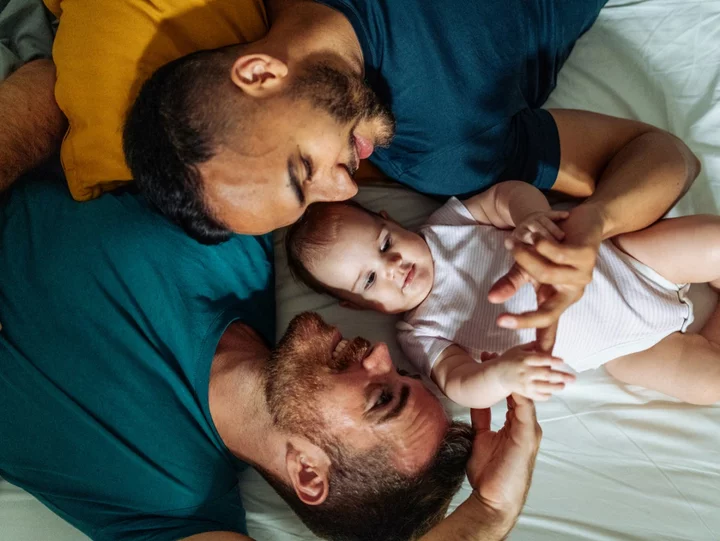
A recent book called The Queer Parent, written by Lotte Jeffs and Stu Oakley, calmly opens with the line: “Ninety per cent of queer parenting is simply… parenting”. It’s a fair point. Whether you’re male, female or non-binary, single or partnered, and regardless of your sexuality, all of us who parent aim to meet the exact same needs for our children, day in, day out.
The title caught my attention because I think there’s something very timely and profound about the act of being a gay or queer parent today. It’s doing the work that many (dare I say most) people want to see in society – namely raising a new generation of non-toxic humans, making the world a happier place to be different – but in the slow grind of parenthood, not just in the quick flash of activism. I really believe gay and queer parents are changing the world, in a very deep yet unsexy way. Mum and mummy being at the school gate, dad and daddy collecting a child from nursery, or as we’ll get into, dad giving birth to a baby son or daughter. They’re changing the world by being active, visible and engaged parents.
But there’s a slightly awkward, under-discussed aspect to this that has truly got under my skin in the eight years since I’ve been a parent. I’m pansexual, so I fancy men as well as women, non-binary people and pans. But oddly I’ve always been frightened to talk about parenthood with most of my avowedly gay male friends – because I’m never quite sure if anyone’s going to derogatorily refer to me as a “breeder” or not.
It’s hard to know how well-known the term “breeder” is. I personally used to hear it a lot more back in the mid-Noughties when I was in my early twenties. It’s essentially a slightly bitchy term that’s interchangeably derogatory to people with kids and/or straight people as a whole. As a word, it’s a pretty effective zinger. Straight people have tended to use sexual imagery to define and denigrate gay people. It seems fair that gay people would do the same to heterosexuals. “Breeder” reduces the pleasures of sex to a slightly dehumanised process. In fact, unconnected to sexuality, Gulliver’s Travels author Jonathan Swift used the term to reduce people to a brutal, almost farmyard functionality in a satirical essay from 1729.
It’s important to establish that I’m not here to spank gay men on the bum. Neither am I here to accuse them of “heterophobia” either – which I’ve put in quote marks because I’m dubious that it can even exist as a concept. If I was an exclusively gay guy, I might robustly define my sexuality against heteronormativity in ways which could be punchy and sharp. I might also – by virtue of a lifetime of homophobia and trauma that may have started in the home as a child – have latently negative views about the whole concept of family. But I am who I am now, and despite understanding all this, I’m still getting weary of it as a trope, and also as a reason not to talk about the many genuine ecstasies of parenthood. I like being a dad and I like dating guys. These things shouldn’t be so controversial – yet weirdly, I find it’s gay men who have more slack-jawed incomprehension of these two facts than any other group in society. My own personal beef is very trifling in the scheme of things, however.
The much bigger picture is that – newsflash – gay, queer and trans people have kids. Loads of them. While data is limited, there was a 40 per cent rise in same-sex parents from 2015 to 2019. Anecdotally, it seems to be a much greater phenomenon than is reported. The same goes for the rarely examined hardships LGBT+ people typically go through to even have kids: namely the incredible anguish of IVF and the epic emotional journey of surrogacy. You’d expect increased visibility of gay and queer parents would have phased out the use of the word “breeder” as a pejorative, but weirdly it lives on – especially on TikTok where, perhaps like an unkillable echo of my own twenties, it’s mostly young people using the word as a way of defining their queerness and riling up straights.
What makes my heart sink, beyond knowing that a younger generation is using the same dumb-ass words people said 20 years ago, is that this is a really, really bad time to start being unsupportive of gay parents. While queer visibility may feel greater than ever, the world is going backwards in many respects. Even just in the realm of children’s culture, things as harmless as a drag artist reading stories can draw an angry mob of culture warriors – as happened at Tate Britain in London in February. Look at Florida – once the home of fictional queer icons The Golden Girls, now home to Republican governor and presidential hopeful Ron DeSantis – and you’ll see books with titles as benign as This Book Is Gay banned as a result of his vociferously “anti-woke” legislation. We all know that creating this type of hostile environment will surely result in more bullying, more hatred, more lives blighted.
While queer visibility may feel greater than ever, the world is going backwards in many respects
It’s pathetic, cruel yet grimly successful at the same time. With every small news story or stunt, a palpable hostility festers. Thus anything that drives a wedge between gay/queer people and parenthood is a bad look right now – especially with elections looming in the US and Britain that I fear will see the issue of gender identity playing a huge, calculatedly divisive role.
What better way to rebuff this negativity than by strongly standing up for gay and queer parents. Specifically, we could start standing up for men having babies. Trans men like the British journalist Freddy McConnell who a few years back gave birth to a child who seems to be doing great (and likes a good splash in the sea), or Iowa-born Tanius Posey, who thankfully was able to breastfeed his child despite simultaneously getting online abuse for it. Logan Brown, also from the UK, is a trans man who has been documenting his pregnancy over the past few months with genuine clarity and candour. He gave birth to his daughter Nova just over a week ago. Celebrated gay NYC artist Keith Haring frequently placed a baby into his work, a shining symbol of hope and playful optimism for the future. Maybe in the same spirit as Haring, we could all do with a new beginning in our attitudes to gay and queer parenting, inspired by a rather miraculous baby such as Nova.
Read More
How OCD can destroy relationships: ‘I had the obsessive fear that I might cheat’
Women with body hair remain a cultural taboo, and I can’t see it changing
Flip-flops, nudity and ‘up the vajayjay!’: How the red carpet became a platform for protest



